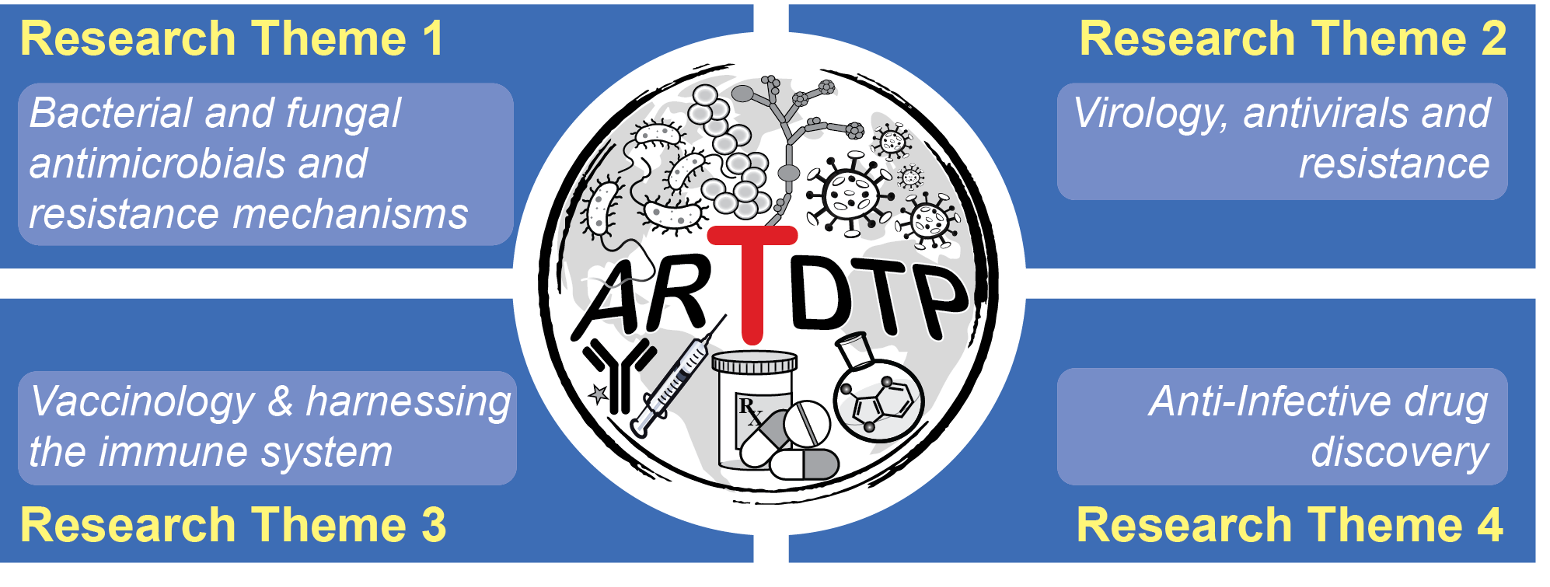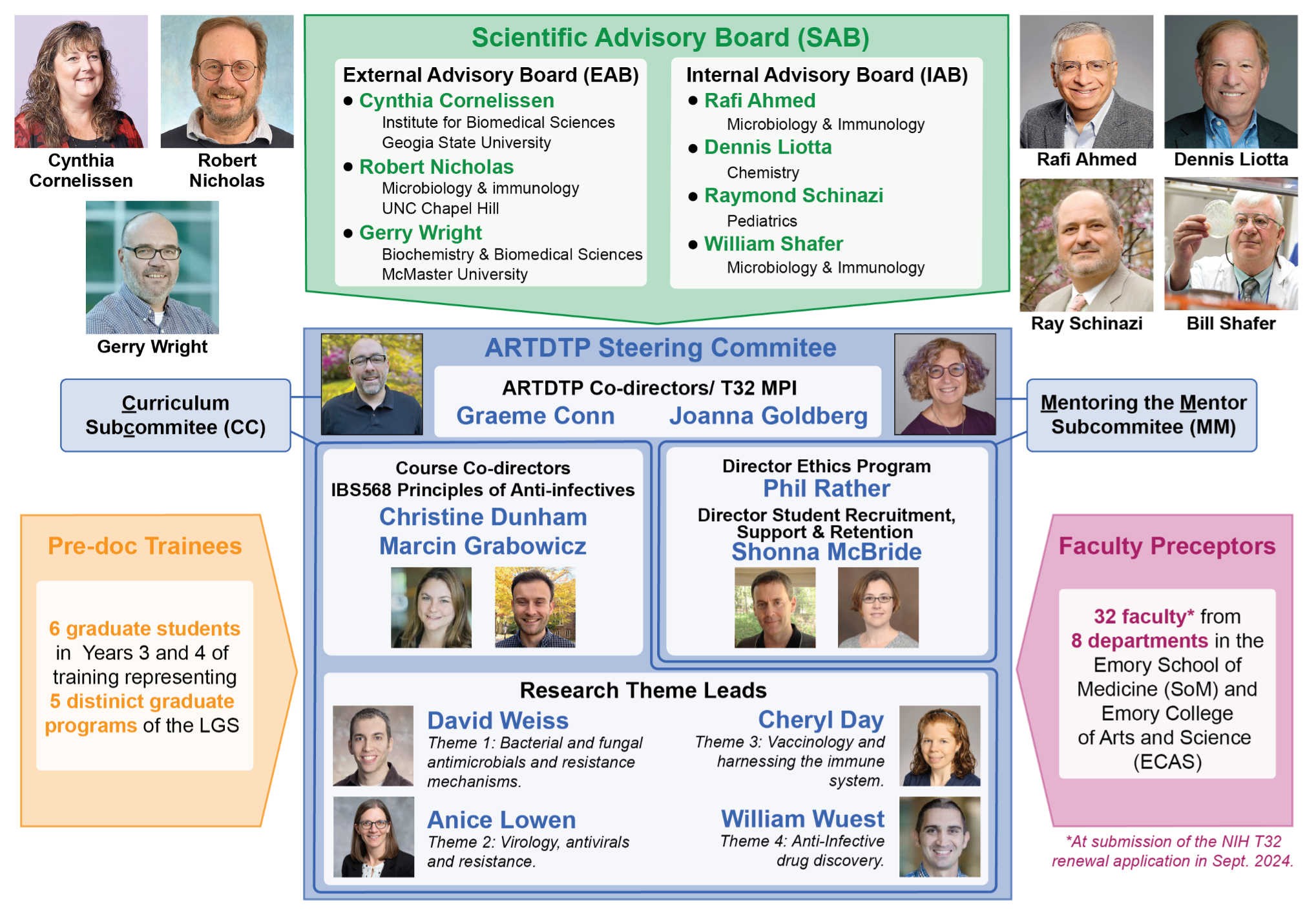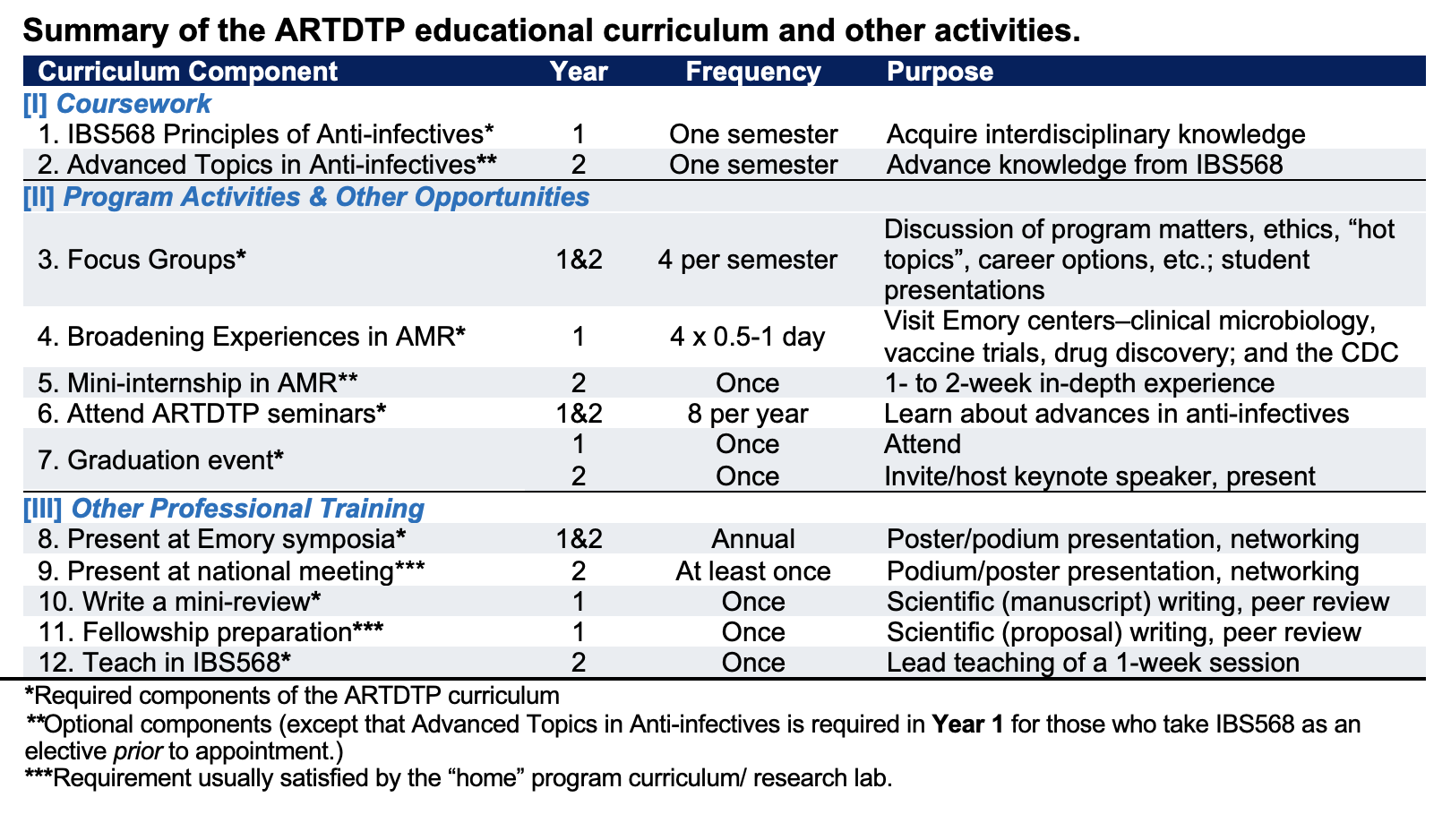About ARTDTP
ARTDTP supports the training of the “next gen” of scientists committed to tackling the most pressing challenges in antimicrobial action, resistance and therapeutic development, and preparing them for diverse and successful careers in academic-, industry- and government-based research as well as in teaching and other biomedical careers related to AMR.
ARTDTP draws graduate (PhD) trainees from five different “home” programs at Emory: the four interdisciplinary programs of the Graduate Division of Biological and Biomedical Sciences (GDBBS) below and the graduate program of the Department of Chemistry.
- Biochemistry, Cell & Developmental Biology (BCDB)
- Immunology & Molecular Pathology (IMP)
- Microbiology & Molecular Genetics (MMG)
- Molecular & Systems Pharmacology (MSP)
These graduate programs provide outstanding specialized training in distinct areas relevant to antimicrobial resistance (AMR). However, efforts in the discovery and development of new therapeutics to overcome AMR (antibiotics, antifungals, antivirals and/or vaccines) will require coordinated contributions from the diverse disciplines supported by these individual graduate programs. ARTDTP aims to bridge disciplines and support the training of researchers with shared knowledge, language, and goals related to AMR. This goal cannot be realized by any one individual graduate program at Emory but has been successfully accomplished by ARTDTP for over a decade.

ARTDTP’s mission is accomplished through a core curriculum and other experiences that expose its trainees to unique educational and research opportunities encompassing the anti-infective arena through four core Research Themes. ARTDTP is supported by a group of nationally and internationally leading faculty preceptors, and outstanding local resources including those of Emory and its affiliated centers and clinical divisions, as well as the adjacent national headquarters of the Centers for Disease Control and Prevention (CDC).
To be eligible for appointment to ARTDTP, prospective trainee appointees must be:
- enrolled and in good academic standing in one of the Emory graduate programs associated with ARTDTP (i.e. BCDB, IMP, MMG, MSP or Chemistry)
- completing their second year of training; ARTDTP only provides support for the third and (contingent on satisfactory progress and participation) fourth years of training at Emory.
- working in a lab of an ARTDTP faculty member (see members here); mentors must also be able to demonstrate availability of research funds to support the trainee’s project.
- engaged in a PhD dissertation research project relevant to one or more of the research themes of ARTDTP.
While ARTDTP does not directly recruit trainees to Emory, we work closely with the leadership of our associated graduate programs and are always happy to discuss the opportunities ARTDTP can provides with prospective applicants to these programs with interests in the AMR arena.
ARTDTP was conceived in 2012 by Dr. William Shafer (Emory, Microbiology & Immunology) through discussions with other Emory colleagues as part of the contemporaneous establishment of the Emory Antibiotic Resistance Center (Emory ARC). ARTDTP was envisaged with the premise that countering the threat posed by all forms of antimicrobial resistance (AMR) will require an influx of highly trained (PhD) research scientists into this arena. This need to train the “next gen” of researchers with deep expertise in their own specialty who are also conversant in the broad swath of intersecting fields that contribute to such efforts is widely recognized in both the scientific literature and lay press. Indeed, efforts to tackle this critical issue in modern healthcare may be even more urgent today than when ARTDTP began.
Funding for ARTDTP from the National Institute for Allergy and Infectious Diseases (NIAID) was secured by Dr. Shafer with the award of an NIH T32 in 2014 (2014-2019) which was subsequently renewed (2020-2025). In 2022, Dr. Shafer was joined as ARTDTP Co-director and T32 MPI by Dr. Graeme Conn (Emory, Biochemistry) as part of a planned leadership transition ahead of the next NIH T32 renewal in 2024. For this renewal application–awarded in August 2025 (2025-2030), Dr. Conn was joined as MPI by Dr. Joanna Goldberg (Emory, Pediatrics) with Dr. Shafer moving to a new role on the Program’s Scientific Advisory Board (SAB).

To date (October 2025), ARTDTP has supported 30 trainees representing the five different graduate programs at Emory and working in the labs of 16 different ARTDTP faculty members. Our trainees have published >75 manuscripts supported by the T32. With the recent renewal of the T32 and appointment (or re-appointment) of our current cohort, we are sure these statistics will quickly become out of date! Please check out the other pages on this website and PubMed for the latest!
Program Leadership and Organization–Central to the ARTDTP program administrative structure is a Steering Committee comprising the Program Co-Directors, four ARTDTP Research Theme Leads, two co-directors of the main didactic course (IBS568 Principles of Anti-infectives), and leaders of the ARTDTP Ethics Program and Student Recruitment, Support and Retention. All major policy decisions, trainee selection for ARTDTP appointment, and performance evaluations of trainees and their mentors (e.g. for second year re-appointments) will be made by non-conflicted members of the Steering Committee.

The Steering Committee will also be supported by an independent Scientific Advisory Board, comprising both an existing External Advisory Board (EAB) and Internal Advisory Board (IAB). The ARTDTP Co-directors also work with the Program Directors/Directors of Graduate Studies (DGS) of ARTDTP home graduate programs as well as leadership of other Emory T32 programs to coordinate programmatic activities, share information, and to ensure trainees receive appropriate support at all times.
Dr. Conn is a Professor of Biochemistry in the Emory University School of Medicine (SoM). His research program focuses on defining the molecular basis of antibiotic resistance arising from ribosomal RNA modification and drug efflux systems, and RNA-mediated regulation of proteins of the human innate immune system using a broad array of approaches including biochemical/ biophysical, structural, computational, and microbiological studies. Dr. Conn also serves as an Associate editor for the journal npj Antimicrobials and Resistance. Since arriving at Emory, Dr. Conn has been an active member of two graduate programs from which ARTDTP appoints its trainees (BCDB and MMG), and has served in multiple leadership roles in these programs. He has also directed the MMG/BCDB Year 2 course Hypothesis Design and Scientific Writing for more than a decade and directed the main ARTDTP course IBS568 Principles of Anti-Infectives course (twice). Dr. Conn received the 2025 Faculty Mentor award from the GDBBS.
Dr. Goldberg is a Professor in the Division of Pulmonary, Asthma, CF, and Sleep in the Department of Pediatrics at Emory University SoM, with a secondary appointment in the Department of Microbiology and Immunology. Dr. Goldberg has worked in the fields of bacterial genetics and genomics, physiology, antibiotic resistance, and pathogenesis, and how these relate to respiratory infections in cystic fibrosis (CF), for over 40 years. Dr. Goldberg is a recognized leader in the Pseudomonas field, and major theme in her research is the synthesis and regulation of surface antigens, including polysaccharides and protein adhesins, and their role in infection. She serves as Co-Director of the Emory CF Biospecimen Repository, providing a resource for ARTDTP trainees and faculty who may want to acquire bacterial isolates from CF patients or make connections with physicians and clinical colleagues at Emory. Dr. Goldberg is also a Senior Editor for the ASM journal Microbiology Spectrum, serves on several other journal editorial boards, and has been honored by election to the American Academy of Microbiology, to the Board of Directors of ASM, and as a Fellow at the American Association for the Advancement of Science. In recognition of her efforts and contributions as a mentor, she was awarded the ASM Graduate Microbiology Teaching Award in 2012. At Emory, she has served as the MMG Program Director (2014-2018), was Co-director of the MMG/BCDB IBS522r Hypothesis Design and Scientific Writing for several years, and has taught in every offering of IBS568 Principles of Anti-infectives.
The goal of the ARTDTP educational curriculum is to complement on-going research training with broad interdisciplinary knowledge and skills related to AMR, as well as career and professional support to enable trainee progression into the scientific workforce in this area. The training curriculum and other training opportunities have been designed to broaden exposure in areas such as clinical microbiology, clinical trials, environmental surveillance, and drug discovery, as well as other initiatives (e.g., “mini-internships”) designed to further broaden and enhance training relevant to AMR and therapeutic development. The formal two-year curriculum consists of a required course (IBS568), teaching and professional development activities, and participation in all ARTDTP-specific events; these components are summarized in the Table below.
